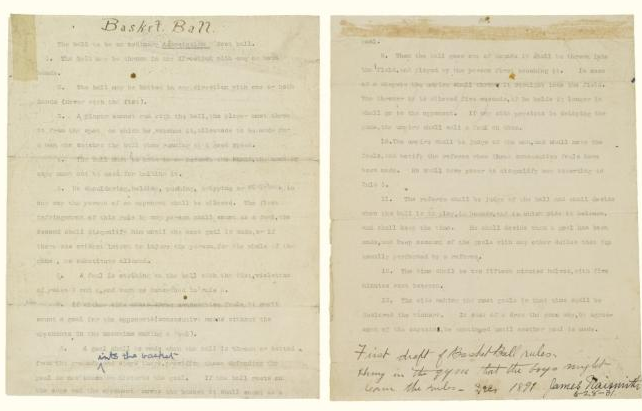Booths purchase original Naismith basketball rules at auction for more than $4 million

Auctioneer David Redden, right, closes the bidding for the Naismith Rules, the original rules for basketball, framed at center, Friday at Sotheby’s in New York. Standing by the rules is former Harlem Globetrotters basketball player Curly Neal. The rules were purchased by David and Suzanne Booth, who hope to bring the document to Kansas University.

David G. Booth, a 1964 Lawrence High School graduate, is chairman and chief executive officer of Dimensional Fund Advisors.
The David Booth file
David Booth moved with his family to Lawrence in 1959.
The family lived at 1931 Naismith Drive, just south of Allen Fieldhouse.
In 1968, David, a Lawrence High School graduate, earned a bachelor’s degree in economics from Kansas University. He also earned a master’s degree in business at KU before heading to the University of Chicago.
The Booth Family Hall of Athletics at Allen Fieldhouse was financed in large part by David Booth and other members of the Booth family — in honor of Gilbert and Betty Booth, longtime Jayhawk fans and Lawrence residents.
David Booth, who lives in Austin, Texas, is a member of the KU Endowment Association’s board of trustees.
In 2008, he donated $300 million to the University of Chicago’s Booth School of Business, which was renamed in his honor.

A photo of the original rules of Basket
Lawrence High and Kansas University graduate David Booth felt so strongly that the two pages on which James Naismith wrote the original 13 rules of basketball should find a home on the KU campus he paid $4.3 million in an auction Friday to guarantee that.
David and his wife, Suzanne Booth, purchased the rules via telephone at an auction that took place at Sotheby’s in New York City, where the rules were sold by the Naismith International Basketball Foundation.
“We’re very excited about it,” David Booth said from his office in Austin, Texas. “I think they need to figure out an appropriate venue for them. I don’t know what that is. Maybe in a (new) museum. Maybe with the statue of Naismith looking back at Phog (Allen). I think it’s a little bigger than the Booth Family Hall of Athletics. This is serious stuff.”
How serious? A copy of the Emancipation Proclamation signed by President Abraham Lincoln and purchased by Robert F. Kennedy drew $3.7 million at the same auction.
The exact price the Booths bid for the rules, written on Dec. 21, 1891, and signed by Naismith in 1931, was $4,338,500, a sports memorabilia record, according to Sotheby’s.
Asked how much higher he would have bid, Booth said, “It was getting close.”
Booth’s motivation for bringing the rules back to where the game’s founder is buried was that “they’re incredibly important and they should be at the University of Kansas. Naismith was there 40 years. He invented basketball and Phog Allen was one of the key figures in making it so popular. Nobody else was going to do it (buy the rules to bring them to KU).”
Booth said he spoke with KU basketball coach Bill Self on Thursday and again Friday, after making the winning bid.
“He’s fired-up,” Booth said. “He looks forward to creating the right venue for them and we’ll work with them. He’s fabulous. He was a factor in us doing this, just his enthusiasm and the way he’s made me feel over the years. He’s amazing how he can make people feel great.”
Booth said that a Wednesday night visit from Mark Allen, Phog’s grandson and a Kansas City physician, was the final push to embolden Booth and his wife for the auction.
“That sealed the deal that we wanted to get aggressive,” Booth said. “Mark helped to give Suzanne the background and importance of Naismith and Allen.”
Booth said Mark Allen also “did a lot of work researching to make sure it was authentic.”
James Naismith’s grandson, Ian Naismith, told the Associated Press in an October interview that the family decided to put the rules on the auction block and to give the money to the Naismith charity that promotes sportsmanship and provides services to underprivileged children.
Many of the 13 rules have been adapted or abandoned since Naismith wrote them for a winter sport for boys of a YMCA in Springfield, Mass. For example, rule No. 7 states: “If either side makes three consecutive fouls it shall count as a goal for the opponents (consecutive means without the opponents in the meantime making a foul).”
“There were some funny ones,” Booth said. “The whole thing seems kind of funny.”
KU chancellor Bernadette Gray-Little expressed gratitude for the Booths’ efforts.
“We are delighted to learn that David and Suzanne Booth have acquired Naismith’s Rules of Basketball, a piece of sports history that is intertwined with the University of Kansas and its storied tradition of basketball excellence,” Gray-Little said in a statement. “Naismith was KU’s first coach and started what would become one of the winningest college basketball programs in the nation and certainly the most tradition-rich.”
Dale Seuferling, president of KU Endowment, said that he and interim athletic director Sean Lester visited Friday afternoon with David Booth and learned of his desire for the rules to be displayed at KU.
“On behalf of all Jayhawk fans, we thank him for his generosity,” Seuferling said.
David Booth graduated from LHS in 1964. He received a bachelor’s degree in economics in 1968 and a master’s degree in business from KU in 1969.







